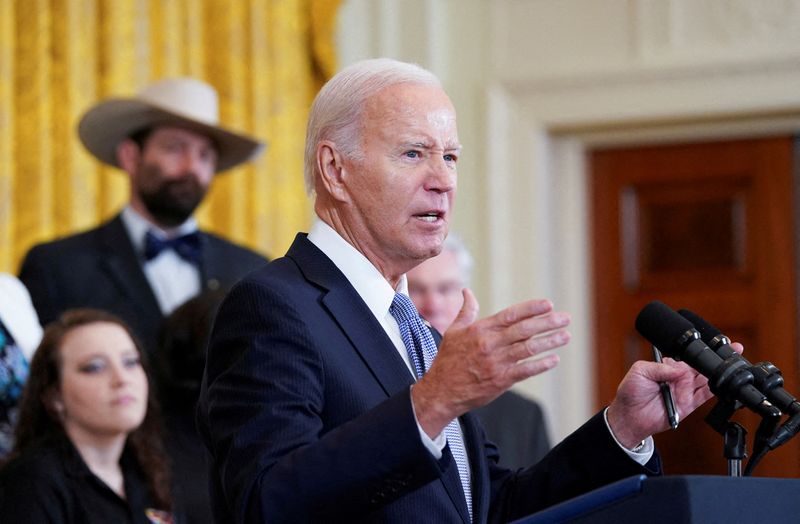By Timothy Aeppel
(Reuters) - A surge of factory building fueled by Biden administration investments in "strategic sectors" such as clean energy and semiconductors has so far flowed disproportionately to U.S. counties with relatively distressed economies and notably has not tracked "Democratic geography."
Since 2021, a group of counties with relatively low employment rates for prime-age workers and low median household incomes - while accounting for only about 8% of national GDP - snared 16% of the $525 billion in announced investments, according to a data analysis by the Brookings Institution and the Massachusetts Institute of Technology.
The study underscores how the embrace of a more muscular industrial policy under Democratic President Joe Biden could spread investments into regions left behind by decades of offshoring.
Industrial policy was long anathema to many U.S. economists and politicians who viewed it as unfairly favoring some industries and regions over others. But the strategy has gained support from a wide swath of the political spectrum, including Republicans, many of them from regions that are now benefiting from the latest push to bolster key businesses.
Mark Muro, a senior fellow in Brookings' Metro program and one of the authors of the study, said the data shows these federal programs are tiled "toward smaller-town areas that are less prosperous."
To the extent that the new push toward industrial policy is a factor in some of these investments, the data suggests "that policy has not simply followed Democratic geography," he said.
Indeed, a disproportionate share of the locales are Republican strongholds that regardless of Biden's largesse lean heavily toward former President Donald Trump in the run-up to the Nov. 5 election, which is shaping up to be a rematch between the two men. In polling, Biden persistently gets low marks for his handling of the economy despite historically low unemployment, persistently strong job growth, and above-average wage increases, especially for the lowest-earning workers.
'SIGNIFICANT DEPARTURE'
The report credits three major pieces of federal legislation enacted under Biden - the Infrastructure Investment and Jobs Act, the CHIPS and Science Act, and the Inflation Reduction Act - with driving the investment boom. These laws, passed in 2021 and 2022, fund a range of subsidies and tax incentives that encourage companies to place projects in disadvantaged regions. For instance, the Inflation Reduction Act has tax credits that include bonuses of at least 10% when an investment is placed in a low-income community.
The researchers defined counties as distressed when they have a median household income below $75,000 and a prime-age employment gap of more than 5%. The employment gap is a widely used gauge of economic health that measures the difference between the national five-year average in the jobless rate for prime-age workers and the average for those workers in a particular county or region.
As of 2022, there were 1,071 U.S. counties that fell into this category - together representing 13% of the U.S. population. The study found those counties have received nearly $82 billion of announced investments, double their share of gross domestic product and 1.2 times their share of the population.
These investments are concentrated in the southern U.S. but extend across other regions - touching 27 states, the report found.
The researchers also compared the recent wave of investments to overall private investments from 2010 to 2020 and found that the latest wave is much more likely to target distressed counties, "suggesting a significant departure from geographic patterns of prior investment," the report said.

Even among these poorer counties, some appear to hold an advantage over others when it comes to attracting new factories. The analysis found that the 70 distressed counties among the 1,071 that have landed investments are those that already had relatively high shares of employment in so-called advanced industries - such as auto manufacturing and clean energy.
"In general, places that are nearer to sources of labor, nearer to suppliers, seem to benefit," Muro said.